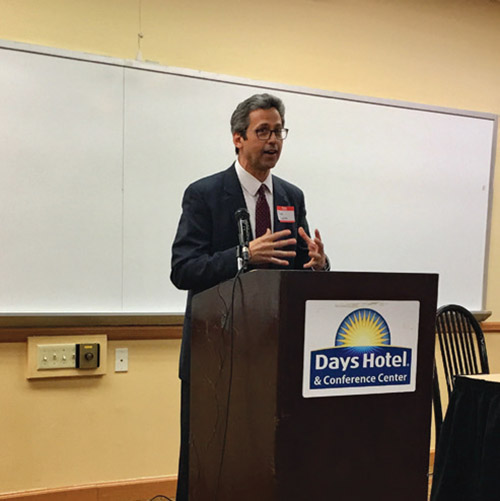




Through their successful advocacy efforts in Trenton. the leaders of the Teach NJS coalition have learned two very valuable lessons. One is that the Jewish community’s voices are greatly amplified when they join with allies from other faiths who share similar goals of strengthening the resources of New Jersey’s non-public schools. The other is that the better you know your allies, the more effectively you can work together on those shared aims.
In that spirit, Teach NJ organized a “Breaking Barriers, Building Bridges: Different Communities Coming Together” event on Tuesday night, April 30, at the Days Inn Conference Center in East Brunswick. Drawing together roughly 40 educators, students and parents from Jewish, Christian and Islamic Schools across New Jersey, the event was fashioned to accentuate connections between the three communities and enhance their capability to work together.
After a welcome from the organizers, the group heard from Shariq Ahmad, the chief of staff of New Jersey Assemblyman Robert Karabinchak. Ahmad, son of Pakistani Muslims immigrants, spoke of his work as chair of the Edison Democratic party and credited a coalition of Indians and Orthodox Jews in helping him achieve his political successes. He quoted Dr. Martin Luther King Jr., “Although we came here on different ships, we’re on the same boat now,” and asserted that “When we realize what we can do together, we can accomplish great things.”
The next to speak to the assembled was Sufia Azmat, the executive director of the Council of Islamic Schools in North America. Azmat noted that from what we see in the news, there seems to be a serious shortage of peace and mercy these days in our country and in our communities. The question is why. She referenced a recent news report on National Public Radio, “The End of Empathy” (https://www.npr.org/2019/04/15/712249664/the-end-of-empathy), which reported that decades of studies show that students are 40% less empathetic than students were a generation ago.
Azmat asserted that, to counter this troubling trend, schoolteachers must teach three types of empathy—cognitive empathy, emotional empathy and compassionate empathy. “We must treat empathy like a muscle,” said Azmat. “And that muscle must develop muscle memory, much like our bodies just know what to do in a fire alarm, or an evacuation, because we’ve practiced it so often. We must push out of our comfort zone. It’s not easy but it’s very important.”
Rabbi Saul Zucker, head of school of Ben Porat Yosef Yeshiva in Paramus, shared that in his experience, when people of different faith communities get together, often the message they share is “We’re really very similar.” He believes, however, that “this message whitewashes the very real, passionate differences of ideology and opinion that make us who we are. We shouldn’t minimize these differences but acknowledge them, because they are the framework of who we really are. And we start from there, to reach out and learn from, and discover what to admire, from each other.”
Rabbi Zucker joked that he believes that students represent the best hope of change, because the adults too often mess things up in intergroup relations. He asked those present to accept that they will disagree with other groups on some important matters but, “so long as we’re talking with one another, and respecting one another,” there’s still much good that can result.
After the speeches those present took part in thoughtful ice-breaker activities, with small groups considering and discussing questions such as “What was your favorite book or television show growing up? Which character did you identify with most?” and “What do you think is the most important character trait for a person to have?” The event concluded with remarks by a few of the student leaders in attendance.
One of the attendees from the Central NJ Jewish community praised the effort. “I wholeheartedly enjoyed meeting everyone at the event and look forward to building new friendships,” said Paula Ostroff from Highland Park, a parent of three RPRY students. “Our ideologies and beliefs vary widely, this is true. Yet we stand together for our children, not in spite of these differences, but because we respect each others’ efforts to preserve their faith while also living fully in our modern world.”
The leaders of Teach NJ view programs like this as a vital aspect of their work in building strong alliances.
“The advocacy work that we do together with other faith-based school communities allows us to speak with a unified voice on issues of common concern,” said Josh Caplan, executive director of Teach NJ. “That was a proven success formula for the doubling of non-public school security funding this year. Having opportunities such as this to connect as people of faith with similar values and goals make these types of coalitions stronger.
“Teach NJ plans to use this program as a jumping-off point to plan a future multi-faith mission to Trenton, to advocate for equitable non-public school funding.”
By Harry Glazer
�













